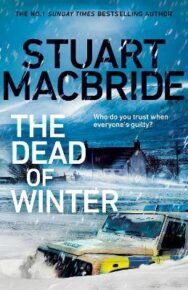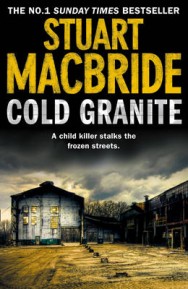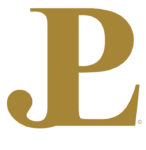‘It wasn’t until I’d finished that I realised the entire book was about redemption. Nearly every character in it, good, bad, or misunderstood, is seeking it in their own way.’
Stuart MacBride is one of Scotland’s bestselling crime writers. With the release of his latest thriller The Dead of Winter, BooksfromScotland caught up with him to chat about his favourite books.
The Dead of Winter
By Stuart MacBride
Published by Bantam Press
The book as . . . memory. What is your first memory of books and reading?
The very first book I can remember is Winnie-The-Pooh. That was the book where I went from being read to, to reading for myself. And. It. Was. GREAT! It was as if I’d performed the most wonderful magic trick and transformed all these lumpy squiggles on the page into sounds and smells and sights and adventures (which I know breaks the alliterative streak, and I suppose I could’ve gone for ‘swashbuckling adventures’, but that doesn’t really cover what Pooh and his friends get up to). It’s a trick that still delights me to this day.
I reread Winnie-The-Pooh and The House at Pooh Corner on a fairly regular basis – it’s a pretty good sign that I’ve reached my limit with mankind’s spiteful, obnoxious stupidity and need a reset. There’s nothing like taking that little furry paw and going for a stroll through the Hundred Acre Wood to lower my blood pressure.
The book as . . . your work. Tell us about your debut novel Cold Granite. What did you want to explore in writing this book?
At the time I was just looking to write the kind of story that I’d love to read – something that featured my hometown, rather than yet another novel set in Edinburgh, London, or Glasgow. Something where the police officers weren’t all Automatons For Justice™ whose every single line of dialogue was dedicated to advancing the plot. NO, I wanted my police officers to have lives outside of the investigation, for them to behave like an actual team does, to have a sense of humour… You know, like real people.
It wasn’t until I’d finished that I realised the entire book was about redemption. Nearly every character in it, good, bad, or misunderstood, is seeking it in their own way.
The book as . . . inspiration. What is your favourite book that has informed how you see yourself?
There isn’t one. Not on its own, anyway. Instead, I’m a hodgepodge of everything I’ve read over the years, so you could say I’m more of a library than a single book. And I’m still a work in progress – new wings get added every year and older volumes are shipped off to the Great Library Cart in the sky, while others remain to be nibbled at by the rats and mice.
The book as . . . an object. What is your favourite beautiful book?
Oooh, now that’s a difficult one. I collect picture books – I’ve a special fondness for the work of Oliver Jeffers and Jonny Duddle – so it could easily be any of those, or the coffee-table-sized copy of Dante’s Inferno with Gustave Dore’s illustrations, but I think I’m going to go with Elektra Assassin. In my humble opinion, it must be one of the most gorgeous graphic novels ever produced. Bill Sienkiewicz’s artwork was ground-breaking in its day, and it’s still astonishing now. Its mix of fine-art paintings, pencil sketches, inks, pastels always fits the story perfectly and, at the time, Frank Miller was pushing the boundaries of what the genre could do narratively. While Miller successfully firebombed his own reputation at the turn of the century, it takes nothing away from the sheer beauty of Sienkiewicz’s work.
The book as . . . a relationship. What is your favourite book that bonded you to someone else?
That would be a dirty-big omnibus edition of James Herriot’s memoirs. Though I suppose ‘bonded’ isn’t quite the right word, as I’d married the person in question by then and they’d be pretty upset if they read this and think we weren’t in some significant way already bonded.
In our household, there is a clear separation of labour – I do the horrible DIY stuff (predominantly sanding and varnishing at the time) and Fiona reads aloud while I do it. The omnibus was the first book we tried it with, and I can still remember to this day the sheer stomach-aching gasps of laughter when we got to Cedric, the farting dog. I think Fiona needed about a dozen goes to get through the page in question without collapsing in a fit of giggles. And my varnishing went pretty wonky as well – paintbrush clasped in one hand while I wiped the tears from my eyes with the other.
The lessons, dear reader, are A: always try to marry someone who’s good at reading out loud, and B: anyone who doesn’t laugh at fart jokes is not worth marrying.
The book as . . . rebellion. What is your favourite book that felt like it revealed a secret truth to you?
I’ve found many truths in books, but the one I’m going to share with you is the one that fundamentally shifted the way I saw something very dear to me. Back in 2016, during a moment of weakness, I let myself be talked into becoming a contestant on Celebrity Mastermind. This was deeply silly of me, because I abhor quiz shows of all varieties, but I said I’d do it, and I’m a man of my word. My topic was to be ‘The Life and Major Works of A.A. Milne’ – which ties us neatly to the first question here – and in order to not make a complete prat of myself on national television, I went out and bought a copy of Ann Thwaite’s biography: A. A. Milne: His Life. It completely changed my understanding of not only the author who wrote the book that turned me into a reader, but also of Pooh and his world.
For example: did you know that Milne’s maths teacher was H.G. Wells? OK, that counts as an interesting bit of trivia rather than a ‘secret truth’ but bear with me.
I hadn’t realised that several of the Hundred Acre Wood’s residents were ‘inspired by’ people in Milne’s life. Like Eeyore. I’d always viewed him as this sad, depressive character, but after reading Thwaite’s book I discovered he was most likely based on Milne’s boss at the magazine, Punch: one Owen Seaman (later knighted, then made a Baronet) who Milne hated. Seaman was a rabid conservative, Milne was a liberal, and they argued about nearly everything.
Going back to reread Winnie-The-Pooh I can see it. Eeyore isn’t a sad little donkey, gloomy because things don’t go right for him … he’s a dick. A nasty, condescending, rude, superior dick. I’ve no idea how I never spotted that in all my previous readthroughs, but there it is, bright as a shiny button.
The book as . . . a destination. What is your favourite book set in a place unknown to you?
Ringworld by Larry Niven – set way off in the future, Louis Wu and a team of odd bods travel to a vast artificial structure that orbits its own star. In case you’re wondering, it’s a great big ring – like a flattened hula-hoop – millions of miles across, built by an ancient race that abandoned it aeons ago.
I must have been about eleven or twelve when I first read it and the whole concept just blew my tiny little mind. The thought of standing on this huge thing where the mid-day sky fades into the blackness of space as the arc of the horizon swoops upward into infinity on either side was just terrific. The floating cities, the weird cultures, beings, and animals. Sadly, I was too young to spot the paper-thin female characters and good-old-fashioned 1970s sexism…
But if you can grit your teeth and squint past those bits, it remains a nostalgic sci-fi romp to somewhere you’ve definitely never been.
The book as . . . the future. What are you looking forward to reading next?
Although Mount TBR is tall enough to need lights atop it to ward off light aircraft, I’m going to be very naughty and avoid scaling it in favour of Burn the Plans by Tyler Jones. I hear – from people I trust on this kind of thing – that it’s a creepy collection of lovely, dark, things-that-go-bump-in-the-night short stories and, apparently, the best horror book to be published for ages.
Now, this might just be me, but given all the genuine horror happening in the world, a little fictional horror sounds like a very welcome escape.
The Dead of Winter by Stuart MacBride is published by Bantam Press, priced £20.
ALSO IN THIS ISSUE
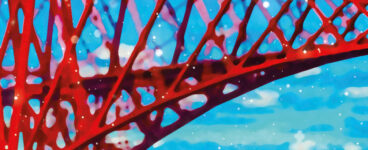
 Rivet Boy
Rivet Boy
‘I have often walked past and wondered what a proper library may look like inside. The well-to-do ge …
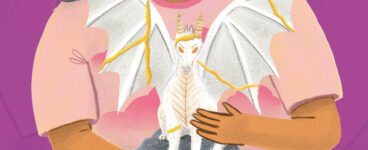
 The Broken Dragon: A Q & A with Karen McCombie
The Broken Dragon: A Q & A with Karen McCombie
‘Readers can expect a short and sweet tale of a dragon-obsessed ten-year-old, plus they’ll learn abo …





